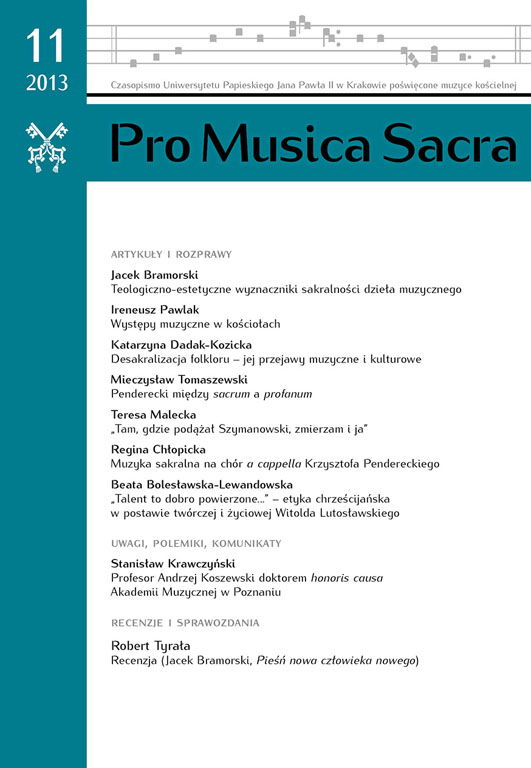Teologiczno-estetyczne wyznaczniki sakralności dzieła muzycznego
DOI:
https://doi.org/10.15633/pms.552Słowa kluczowe:
muzyka w liturgii, wyznaczniki sakralności dziela muzycznego, ars celebrandi, estetyka teologiczna, Joseph Ratzinger (Benedykt XVI)Abstrakt
In the face of great music, a human being rises in the attitude of contemplative admiration, feeling the border of everyday life is crossed and the land of transcendental beauty entered. Joseph Ratzinger ‒ Benedict XVI is an experienced guide on this way. Recollecting the ancient concept harmonia mundi, he outlined with impressive momentum the cosmic character of church music, in which heaven joins the earth, and the singing of angels with the singing of people so as to admire God the Creator in one ”new song”. Referring to the ancient logos theory, card. J. Ratzinger presented it as the expression of human longing for the possibility of a dialogue with the Absolute. The eternal Logos receives the face of a human being full of love in Jesus Christ. Christ sends the Holy Spirit, to lead the christian to discover the excellence of Divine Beauty reflecting itself in music. The Holy Spirit makes this beauty express itself in the life of the Church being the Mystical Body of Christ. Participating in the beauty of Divine life becomes possible thanks to liturgy, in which ”the new song” of the Poeple of God pilgrimaging to the eternal home in heaven, resounds continually. The above aspects indicate the basic theological and esthetic determinants of the musical work as sacral.Pobrania
Opublikowane
2013-12-30
Numer
Dział
Artykuły i rozprawy
Licencja
Prawa autorskie (c) 2013 Jacek Bramorski

Utwór dostępny jest na licencji Creative Commons Uznanie autorstwa 4.0 Międzynarodowe.
Autorzy publikujący w czasopiśmie udzielają jego wydawcy zgody o następującej treści:
- Autor zachowuje autorskie prawa majątkowe do utworu, a jednocześnie udziela wydawcy czasopisma zgody na jego pierwszą publikację w wersji drukowanej i wersji online na licencji Creative Commons Uznanie autorstwa 4.0 Międzynarodowe oraz zgody na wykonywanie opracowań, w tym przekładów.
- Autor ma możliwość udzielania zgody niewyłącznej na opublikowanie utworu w wersji, która ukazała się w czasopiśmie (np. zamieszczenia go w repozytorium instytucjonalnym lub opublikowania w książce), wraz z informacją o jego pierwszej publikacji w czasopiśmie.
- Autor może umieścić swój utwór online (np. w repozytorium instytucjonalnym lub na swojej stronie internetowej) jeszcze przed zgłoszeniem utworu do czasopisma.

